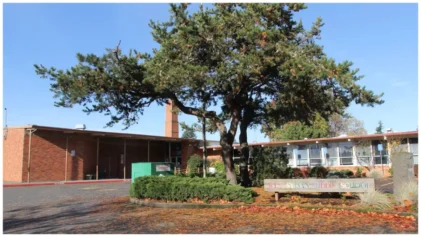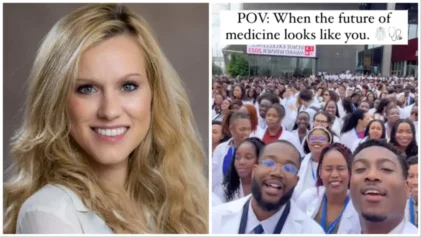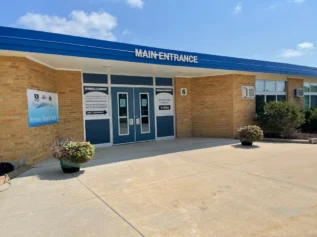
Dr. Martinique Free (from left), D. Michael Lyles, and Brenda Donald, participate as panelists at the Congressional Caucus on Black Women and Girls discussion on missing Black women and girls. (Image courtesy of Office of BWC).
One missing Black child is one too many.
Now, a congressional caucus founded by three African-American women is promising to present a report by the end of the year with solutions on tackling the issue of missing Black children nationwide.
The Congressional Caucus on Black Women and Girls hosted a town hall event at the Library of Congress on Wednesday, April 26, to discuss the national epidemic of missing Black youths, as well as the racial disparity among missing women and girls across the country, according to CNN. Founded by Reps. Yvette Clarke (D-N.Y.), Robin Kelly (D-Ill.) and Bonnie Watson Coleman (D-N.J.) in 2016, the caucus consists of over 20 lawmakers committed to providing solutions to issues impacting African-American women and girls.
“We don’t want to just talk about the problems, we want to think about the solutions,” Kelly said at the meeting, titled #MissingNoMore.
The forum came amid calls for the federal government’s help in locating a number of young Black girls reported missing from the Washington D.C., area late last month. Public outrage ensued after the teens’ disappearances failed to garner much media attention, aside from a few local news reports and efforts by D.C. Metropolitan Police to share the names and faces of the teens on social media.
Speakers at the event called on Congress to provide additional resources to help agencies like the courts, police departments, health care organizations and social services effectively collaborate and help bring the missing girls home.
Statistics from the Black & Missing Foundation showed that of the 647,435 people reported missing in the U.S. last year, 242,295 of them were either Black American, Asian or Indian. More specifically, 218,818 Black people went missing in 2016, according to an FBI National Crime Information Center report.
“I feel like knocking on every door in this city, searching every basement, every attic and every garage to see where these girls are, if they’re still here,” said House Minority Leader Nancy Pelosi, calling the increased likelihood of women and girls of color to go missing “an injustice.”
.@NancyPelosi "I feel like knocking on every door in this city 2 find our girls. We take an oath to protect our people" #MissingNoMore #CBWG pic.twitter.com/BtMuK65cR6
— The Caucus on Black Women & Girls (@CBWGCAUCUS) April 26, 2017
“How could it be? We protect our people, that’s the oath we take — to protect and defend,” she continued. “And, yet, our women and girls, especially of color, are victimized in this very unjust way?”
While many of the missing D.C. girls are suspected to be runaways, panelists wanted to dispel the myth that ALL missing Black girls are escapees of difficult situations at home. Experts say there are a number of reasons children go missing, including mental health issues, domestic violence and the growing threat of child sex trafficking.
“We miss so many young ladies that are being exploited because we do not see African-American girls as victims,” said Kisha Roberts-Tabb, a juvenile probation officer with Cook County Juvenile Courts. “Oftentimes, we see them as being misbehaved or fast.”
Roberts-Tabb went on to argue that taking these girls off the streets and throwing them in juvie ultimately does more harm than good.
“What’s happening in these detention facilities is they’re breeding grounds” she said. “They’re in there with girls like them who aren’t ready to get out of the life … exchanging contacts on social media and end up working for that girl’s pimp.”
Stephanie Cooney, a legal fellow with the Black Women’s Health Imperative, also discussed the dangers of social media and public hangout spots, which are frequented by traffickers.
“There are parks. There are malls. There are recreation centers,” Cooney said. “Traffickers know where minors frequent. They know where to meet them. They know where to talk to them. They can very well be your community members.”
Caucus members have since pledged to advocate for more funding, housing, training and other resources to agencies working to keep more children from going missing.
“Somebody’s got to work in this space,” Coleman told the event’s speakers. “I tell you, we are ready wiling and able. We will be whatever kind of motivation or impetus that is needed.”
A huge thank you to everyone who tuned in to today's event. We're looking forward to working w all of you to end this. #MissingNoMore #CBWG pic.twitter.com/cvltkhGd8r
— The Caucus on Black Women & Girls (@CBWGCAUCUS) April 27, 2017


